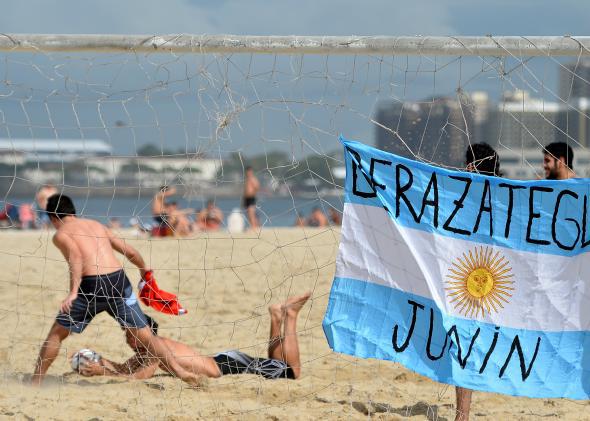BUENOS AIRES—I have always had trouble processing the bitterness of the soccer rivalry between Argentina and Brazil.
I can still remember my surprise at watching my first World Cup final in Buenos Aires. It was 1998 and France was playing Brazil in Paris. The Argentines I watched with were loudly cheering every single French goal as if it had been scored by Diego Maradona. I’m Brazilian, as is my dad, but my mom is Argentine so ours was always a dual-allegiance household. Sure, I’d long had more of an affinity for La Albiceleste but that was more about sibling rivalry—my older brother was a huge backer of the Seleção Canarinho.
In Argentina, the same people who spend their summers vacationing on Brazilian beaches yearn desperately for their neighbor’s defeat in soccer. Just getting to the World Cup final would have been enough to make 40 million Argentines happy. That it will take place in Brazil—at the iconic Maracanã no less—and come days after the hosts suffered a humiliating 7-1 defeat at the hands of Germany amounts to a sizable cherry on top. “My first goal is for Argentina to win the Cup. My second is for Brazil to lose,” a friend told me at the beginning of the tournament when I was complaining about anti-Brazilian fervor. It’s a characteristic I’ve become used to in my nine years of living in Buenos Aires.
The rivalry has been out in full force over the past month—and has caused plenty of skirmishes in and around stadiums—as tens of thousands of Argentines descended on Brazil singing what has become the country’s anthem in this World Cup.
Set to the tune of Credence Clearwater Revival’s Bad Moon Rising, Argentines have been taunting: Brasil, decime que se siente, tener en casa a tu papá (“Brazil, tell me how it feels, to have your daddy in your house”). It’s an ode to Argentina’s defeat of Brazil in the 1990 World Cup and a prediction that Lionel Messi will win the trophy in Rio. Even the players have gotten in on the fun. Here they are singing the taunt as a celebratory chant in their locker room after beating Belgium to advance to semifinals.
(After Brazil’s historic loss to Germany, Argentine soccer legend Diego Maradona took the taunting even further, changing siente to siete—Spanish for seven.)
Brazilians would be right to dismiss the song as ridiculous. After all, Brazil has won two World Cups since Argentina’s last World Cup final ended in defeat to West Germany in 1990. Argentina, meanwhile, last came out on top in 1986 (also against the Germans). Brazil also has five titles to Argentina’s two. Argentina has at times been considered a sort of regional little brother to Brazil, with its larger population and collection of soccer trophies. But now Brazilians face the terrifying prospect of the “daddy in your house” heckles gaining a ring of truth. The fabled Argentine arrogance that so grates on so much of Latin America could reach new heights. Brazilians are also in the position of having to root for the team that ruthlessly booted them from their own Cup. As the front page of Brazil’s sports newspaper Lance! blared the day after Argentina’s victory: “Germans since we were little children.” The subhead: “Germany ended the dream of a sixth championship for Brazil. Let them now prevent Argentina’s third championship!”
Argentines may have their song, but Brazil has also done plenty to fuel the animosity. One Brazilian beer ad, for example, tells the tale of a group of Brazilians who invited over a house-full of Argentines for a party. “Our house is open for you to come in and feel like you’re in Buenos Aires,” the seemingly hospitable Brazilians tell their neighbors before locking the door and rocketing the house off into oblivion.
In Argentina, of course, there is also pride in what the national team has achieved, and not just schadenfreude for Brazil’s failure. Part of what has been so exciting about watching Argentina in this World Cup is how much the team has grown as it moved through the competition. This new team unity started to become evident against Switzerland, only to be more on display in the quarterfinals against Belgium, and truly solidify itself on Wednesday. Proof of that is just how much the goalless Messi was pushed out of the headlines of Argentine newspapers and how what was widely seen as the team’s main liability—defense—is suddenly being seen as an asset.
Two new heroes emerged after the last game. One was obviously the goalkeeper Sergio Romero, who saved two penalty kicks. But the real hero was Javier Mascherano, who carried out an astounding, perfectly executed tackle to prevent Arjen Robben from scoring the winning goal in the game’s final minutes. “I tore my anus, that’s why I was in so much pain,” Mascherano later said after injuring himself on the tournament-saving play.
More than a single play though, Mascherano illustrated why he’s the psychological leader of the team, the one who can bring Messi’s brilliance down to earth and make sure that all of the team’s players operate as one. Never has his nickname of El Jefecito (little boss) seemed more apt than in this brief clip that shows Mascherano pumping up Romero for the penalties. Today you become a hero, he promised.
Social media has since exploded with odes to Mascherano, including pictures of him as Che Guevara and Argentine independence hero José de San Martín.
Brazilians can cheer for Germany all they want on Sunday, but Argentina has already fulfilled its goal of reaching the final in enemy territory while the hosts have to play a humiliating third-place match. They’ve done it with a team that has only grown stronger as the tournament has progressed, making it past each round without scandal or controversy to boot (not always a given for Argentina). There’s one more (very hard) step before glory can be theirs, but in many ways Argentina has already won.
